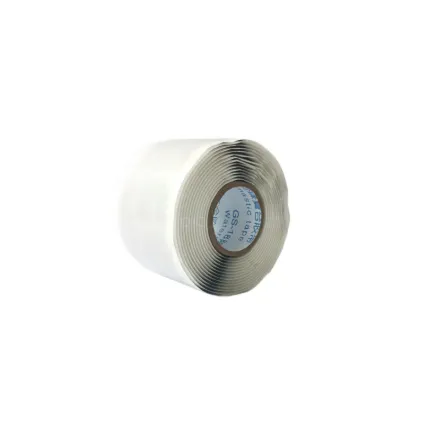If you're looking for a flexible, weather-resistant sealant tape that delivers long-term performance, butyl rubber tape is a top choice. Known for its strong adhesive, excellent waterproofing capabilities, and versatility, this pressure-sensitive tape is widely used in construction, automotive, roofing, and electrical insulation projects.

Whether you’re a contractor, distributor, or OEM buyer, sourcing the right butyl rubber tape supplier and understanding what impacts butyl rubber tape price is essential to maximizing both performance and value. Here’s everything you need to know.
What Is Butyl Rubber Tape?
Butyl rubber tape is a non-curing, sticky, and highly elastic tape made from butyl rubber — a synthetic elastomer known for its airtight and watertight sealing properties. It adheres well to a variety of surfaces, including metal, plastic, concrete, glass, wood, and membranes.
This type of tape is typically used for:
Sealing seams and joints in metal roofing
Flashing windows, skylights, or HVAC systems
Damping vibrations and noise in vehicles
Waterproofing in electrical and cable installations
Sealing panels, ducts, or pipe penetrations
Because it remains permanently tacky, butyl tape offers long-lasting flexibility even in extreme temperatures, UV exposure, or constant moisture.
Key Benefits of Butyl Rubber Tape
100% waterproof – Ideal for roofs, windows, and underground piping
Highly adhesive – Bonds strongly without heat or tools
UV and weather resistant – Perfect for outdoor or exposed areas
Flexible and stretchable – Conforms to irregular surfaces and expands with movement
Non-hardening – Maintains a soft seal over time without cracking or drying out
These properties make butyl rubber tape one of the most durable and low-maintenance sealing solutions available.
Types of Butyl Rubber Tape
When browsing butyl rubber tape for sale, you’ll encounter a few variations:
1. Single-Sided Butyl Tape
Adhesive on one side
Common for roofing, flashing, or HVAC sealing
Often used with aluminum or rubber facing for added strength
2. Double-Sided Butyl Tape
Sticky on both sides
Ideal for panel bonding, waterproof membrane overlaps, and RV repairs
3. Butyl Mastic Tape
Thicker, putty-like consistency
Common in automotive or underground utility work
Provides excellent adhesion and gap-filling
4. Aluminum-Faced Butyl Tape
Withstands heat and UV exposure better
Used in roofing and duct sealing applications
Always choose the tape type based on environmental exposure, surface type, and required durability.
Sourcing a Reliable Butyl Rubber Tape Supplier
If you're buying for industrial use, private labeling, or wholesale resale, choosing the right butyl rubber tape supplier is critical. Look for suppliers who offer:
✅ Consistent quality and stable formulations
Customization (widths, lengths, colors, liners, branding)
Volume pricing and flexible MOQs
Certifications like ISO, RoHS, or ASTM standards
Global shipping and documentation support
Butyl Rubber Tape Price: What to Expect
The butyl rubber tape price depends on several variables:
|
Factor |
Impact on Price |
|
Roll dimensions |
Wider, thicker, and longer rolls cost more |
|
Backing material |
Aluminum-faced and reinforced tapes are pricier |
|
Adhesive strength |
Higher tack formulations cost more |
|
Order volume |
Large orders drastically lower cost per unit |
|
Custom packaging |
OEM labels or printed cores add to cost |
|
Certifications |
Compliance with UL, ASTM, or CE may raise prices |
Typical Price Range (as of current averages):
|
Tape Type |
Retail Price (per roll) |
Bulk Price (per roll) |
|
Standard Butyl Tape (2"x33ft) |
$5 – $12 |
$1.80 – $4.50 |
|
Aluminum-Faced Butyl Tape |
$8 – $18 |
$3.50 – $7.50 |
|
Butyl Mastic Sealant Rolls |
$10 – $20 |
$4 – $9 |
|
Double-Sided Butyl Tape |
$7 – $14 |
$3 – $6 |
If you're a contractor or reseller, buying directly from a butyl rubber tape supplier or factory can reduce your cost by up to 50%.
Best Use Practices
To get the most from your butyl rubber tape:
Apply on clean, dry surfaces for best adhesion
Press firmly to eliminate air pockets
Use in overlapping layers if sealing seams or flashing
Store in a cool, dry area to extend shelf life
Avoid stretching during application, which can reduce long-term seal performance
Proper installation ensures a watertight seal that can last for 10–20 years, depending on conditions.
Butyl Tape FAQs
Q1: What surfaces does butyl rubber tape stick to?
A: Butyl tape adheres to metal, glass, concrete, wood, plastic, rubber, EPDM, and more.
Q2: Is butyl tape paintable?
A: Generally no — paint won’t adhere well to the surface. If aesthetics matter, use tape under flashing or siding.
Q3: How long does butyl rubber tape last?
A: When applied correctly, it can last 10–20 years, depending on exposure.
Q4: Can I use butyl tape in high temperatures?
A: Standard butyl tape withstands up to 80°C. For higher heat, use aluminum-faced versions or look for heat-rated specs.
Q5: Where can I buy butyl rubber tape for sale in bulk?
A: www.qiangdatape.com.
-
XIANGFAN Rubber Tape-Ultimate Solutions for All Your Insulation NeedsNyhederJun.24,2025
-
XIANGFAN Rubber Tape-Protection for Industrial and Residential ApplicationsNyhederJun.24,2025
-
XIANGFAN Rubber Tape: Superior Safety and Sealing for Demanding EnvironmentsNyhederJun.24,2025
-
XIANGFAN Rubber Tape: Reliable Solutions for Every Electrical ChallengeNyhederJun.24,2025
-
XIANGFAN Electrical & Industrial Tape: Powering Reliability Across IndustriesNyhederJun.24,2025
-
XIANGFAN Electrical & Industrial Tape: Excellence in Every ApplicationNyhederJun.24,2025
